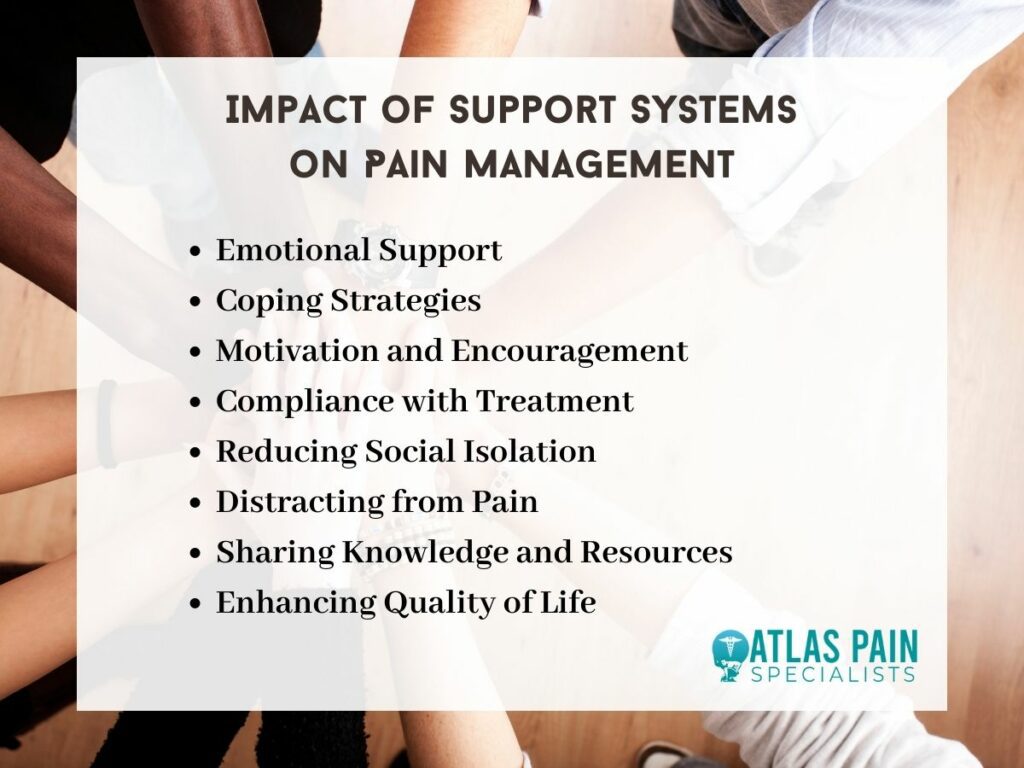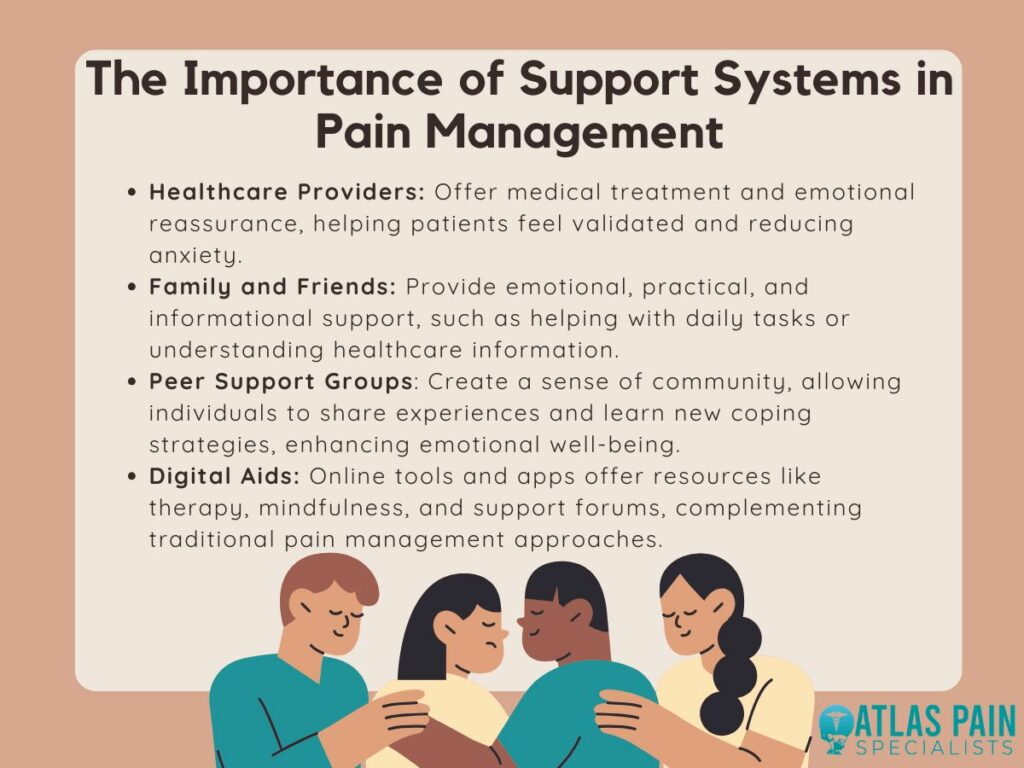

The Role of Support Systems in Pain Management
Pain, an unpleasant sensory and emotional experience associated with actual or potential tissue damage, is a universal human experience. Pain can stem from numerous sources, such as illness, injury, surgery, or chronic conditions, and its management is a crucial aspect of healthcare. So, what is the role of support systems in pain management?
The Global Burden of Disease Study 2017 highlighted that conditions with pain as a primary symptom are leading causes of disability worldwide. As we delve into the dynamics of pain management, the importance of support systems cannot be overemphasized.
Support systems—ranging from healthcare providers to family members, friends, peer support groups, and digital aids—can significantly influence the trajectory of pain management and the overall quality of life of those enduring pain.
Table of Contents
Pain Management: A Multidimensional Approach
Pain is not merely a physical sensation—it encompasses emotional, psychological, and social dimensions, necessitating a multidimensional management approach. Comprehensive pain management extends beyond pharmacological treatments to include psychological interventions, physical therapies, and the incorporation of support systems.
Adopting a holistic approach that acknowledges the patient's physical discomfort, mental health, and social well-being sets the stage for a more effective and personalized pain management strategy. Furthermore, a holistic approach to pain management recognizes that the mind and body are interconnected, and addressing all aspects of pain can lead to more sustainable and lasting relief.
Incorporating support systems, such as family involvement, support groups, and community resources, can provide invaluable emotional and social support, reducing feelings of isolation and improving overall well-being. By embracing a multidimensional approach, healthcare providers can work collaboratively with patients to craft personalized pain management plans that optimize comfort, function, and overall quality of life.
The Importance of Support Systems
Pain, whether acute or chronic, undeniably influences an individual's physical well-being, psychological health, and overall quality of life. Effective pain management is multifaceted, necessitating more than just medical interventions—it requires robust support systems.

Healthcare Providers
They play an instrumental role in diagnosing, treating, and monitoring patients' pain levels. This involves prescribing medication, recommending physical therapy, or advising on lifestyle changes. Beyond these tasks, healthcare providers also offer emotional support and reassurance to patients.
Healthcare providers validate the patients' experiences, empathize with their situation, and provide hope—actions that build trust, alleviate anxiety, and enhance the patient's commitment to the pain management process.
Family and Friends
The role of loved ones in pain management is critical. They provide emotional, practical, and informational support. Emotional support comes in the form of understanding, empathy, and reassurance. Practical support could include assistance with daily activities or transportation to healthcare appointments.
They also provide informational support, accompanying patients to appointments and aiding in understanding and remembering healthcare information.
Peer Support Groups
Peer support groups play a crucial role in pain management by fostering a sense of community and empathy among individuals facing similar challenges. These groups create a safe space where participants can openly discuss their pain experiences, fears, and frustrations without judgment.
Being surrounded by others who understand their struggles can provide a tremendous source of comfort and validation. Through these interactions, participants may discover new coping techniques, lifestyle adjustments, and non-medical interventions that have worked for others in similar situations.
Peer support groups complement formal medical treatment and therapeutic interventions, promoting a holistic approach to pain management that addresses not only the physical aspects but also the emotional and social dimensions of living with chronic pain.
Digital Aids
With the digital revolution, applications and online platforms have emerged as valuable components of support systems. Digital pain management tools can offer resources like cognitive-behavioral therapy, mindfulness exercises, physical therapy guidelines, and community forums where individuals can share their experiences and gain support.

Impact of Support Systems on Pain Management
Support systems play a significant and positive impact on pain management, especially for individuals dealing with chronic pain. Here are some ways in which support systems can influence pain management:
Emotional Support
Dealing with chronic pain can be emotionally taxing, leading to feelings of frustration, anxiety, and depression. Support from family, friends, or support groups can provide a much-needed emotional outlet. Expressing emotions and receiving understanding and empathy from others can help reduce emotional distress and promote a sense of psychological well-being.
Coping Strategies
Support systems can offer valuable insights into various coping strategies that have worked for others dealing with similar pain conditions. Individuals may learn new techniques for managing pain, stress, and anxiety that they might not have considered on their own.
Motivation and Encouragement
Chronic pain can be discouraging, leading some individuals to lose hope or motivation to pursue treatment options. Support systems can provide motivation and encouragement, reminding individuals that they are not alone in their journey and that progress and improvements are possible.
Compliance with Treatment
Having a support system in place can increase adherence to treatment plans. When individuals feel supported and accountable to others, they are more likely to follow through with prescribed medications, physical therapy, and lifestyle changes.
Reducing Social Isolation
Chronic pain can lead to social isolation as individuals may withdraw from social activities due to discomfort or limitations. Support systems provide opportunities for social interaction, helping to combat feelings of loneliness and fostering a sense of belonging.
Distracting from Pain
Engaging with support networks and participating in activities with others can help distract individuals from their pain, at least temporarily. This distraction can have a positive impact on pain perception and overall well-being.
Sharing Knowledge and Resources
Within support systems, individuals may share information about pain management resources, healthcare providers, and alternative therapies that have benefited them. This sharing of knowledge can lead to increased awareness and access to helpful treatments.
Enhancing Quality of Life
A strong support system can contribute to an improved overall quality of life. By addressing pain's emotional, psychological, and social aspects, individuals can experience a more holistic approach to pain management, leading to enhanced well-being and functioning.
Challenges and Recommendations
While support systems are integral to pain management, there are challenges to their optimal utilization. These can include a lack of awareness about the importance of support systems, inaccessible or unaffordable resources, or stigmatization related to pain, particularly chronic pain.
Patients, healthcare providers, and policymakers must work collectively to overcome these barriers. Patient education regarding the role of support systems, the development of accessible digital tools, the incorporation of psychological interventions in routine pain management, and advocacy for policies supporting comprehensive pain management are just a few strategies to enhance the integration of support systems in pain management.
Is Your Lifestyle Causing Chronic Pain?
While challenges persist, concerted efforts can ensure that support systems reach their full potential in assisting pain management, ultimately enhancing the overall well-being and quality of life of those experiencing pain.
Lifestyle factors should also be considered to play a significant role in chronic pain. Making positive changes, like regular exercise, a balanced diet, and stress reduction, can improve pain management. Embracing support systems also enhances overall well-being.
To learn more, read Is Your Lifestyle Causing Chronic Pain?
About Dr. Sean Ormond



